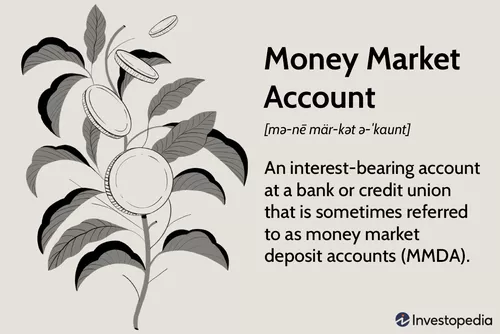A money market account (MMA) is a type of savings account thattypically pays higher interest rates than a traditional checking or savings account.MMAs are especially popular for people who want to keep their cash accessible but don’t need the convenience of daily withdrawal access. There are a few things to keep in mind if you want to open an MMA: you need to be comfortable with online banking, and you might have more restrictions on which banks offer MMs. Read on for everything you need to know about money market accounts!
How does a money market account work?
A money market account is a type of savings account that typically offers higher interest rates than other types of savings accounts. These accounts are typically administered by banks and offer limited access to withdraw funds.
The benefits of a money market account include:
Higher Interest Rates: Money market accounts usually offer higher interest rates than other types of savings accounts. This is because these accounts are typically considered to be liquid, which means that they can be accessed quickly for short-term needs.
Limited Access to Withdraw Funds: Money market accounts typically do not allow depositors to withdraw funds without incurring penalties or fees. This limitation is intended to protect the bank’s liquidity and ensure that the account remains open to new deposits.
How Does a Money Market Account Work?
When you open a money market account, you will receive a certificate of deposit (CD) from your bank. This certificate of deposit is an IOU that your bank promises to pay you back with interest over a set period of time, usually six months or one year.
As long as you keep your CD in good condition, the bank will honor it and pay you the agreed-upon interest rate. If at any time you want to withdraw your
Is a money market account a good idea?

A money market account (MMA) is a type of savings account that offers higher interest rates than other bank account products. MMA accounts also have lower minimum balances and no fees for the first six months.
Some important things to consider before opening an MMA include your expected use for the funds and whether you feel comfortable locking in your money at a particular interest rate for an extended period of time. Additionally, keep in mind that an MMA may not be right for you if you plan on regularly drawing on the account or if you anticipate needing to access the funds quickly.
Why would someone use a money market account?
A money market account is a type of savings account with higher interest rates and less risk than traditional checking or savings accounts. You can use a money market account to save money for short-term needs, such as covering unexpected costs or emergencies. Money market accounts are also good for people who want to invest their money but don’t want the risks associated with other types of investments, such as stocks or bonds.
How does a money market account work?
When you open a money market account, you deposit funds from your checking or savings account into the account. The bank then loans these funds to other customers, usually businesses that need short-term borrowing to cover costs, such as inventory purchases. These businesses typically pay interest on the loans they take out from the bank, which helps to make up for the lower interest rates on money market accounts.
What are some benefits of using a money market account?
Some benefits of using a money market account include:
1. Higher interest rates than traditional checking or savings accounts.
2. Access to your funds quickly and without waiting days or weeks for an approval process.
3. Less risk than investing in stocks or bonds because the bank is responsible
What is a money market account account?
A money market account is a savings account that offers higher interest rates than regular savings accounts but with fewer features. These accounts usually have a maturity date of one year or less, and are FDIC insured.
The main advantages of a money market account are that they offer high interest rates (between 2 to 6%) and minimal fees. However, there are some drawbacks: money market accounts typically have a short maturity date, meaning that you would need to withdraw your funds within a year or less in order to receive the highest interest rate. Additionally, these accounts do not offer features such as check writing or automatic transfers, which can make them less versatile than regular savings accounts.
Can you lose your money in a money market account?
Money market accounts (MMAs) are a type of account that allow you to store your money with a financial institution. MMs typically have a higher interest rate than other bank accounts, and they are FDIC-insured. That means the FDIC will cover any losses that occur in the account.
However, there is one potential downside to Money Market Accounts: you could lose your money if the bank fails. This is because MMs are called “money market accounts” because they are used for short-term investments, which means that you could lose your money if the market for this type of investment goes down.
That being said, it’s important to understand the risk involved in investing in a Money Market Account. You should also be aware of the penalties associated with withdrawing your money early. And, finally, always make sure to keep track of your account balance so you can adjust your savings accordingly.
What is the downside of a money market account?
A money market account, also known as a stability account, is a low-risk investment account that typically offers higher interest rates than other types of accounts. The downside to money market accounts is that they are not FDIC insured, meaning that if the bank fails, your deposits are at risk. Additionally, money market accounts are typically not considered to be deposit options for those with high-risk appetites.
Which is better a money market or savings?
When it comes to which is better a money market or savings account, the answer is both options have their pros and cons.
A money market account offers depositors a higher yields then a savings account, but the interest rates are usually lower than those on certificates of deposit or bonds. Money market accounts are also FDIC insured, meaning that your assets are guaranteed by the federal government in the event of financial institution failure.
On the other hand, a savings account does not offer as high of yields as money market accounts, but they come with more stability since they usually offer FDIC insurance and are insured by state governments as well. Savings accounts can also be accessed more easily for everyday expenses like groceries or gas.
Where should I put my money instead of a savings account?
If you’re looking for a place to store your cash while also earning a bit of interest, a money market account may be the right option for you. Money market accounts are like savings accounts, but they offer higher interest rates and are usually less FDIC-insured than traditional savings accounts.
There are a few things to keep in mind when choosing a money market account. First, make sure you’re comfortable with the account’s minimum opening balance requirement. Many banks require a minimum deposit of $500 or more to open a money market account. Second, be aware that money market accounts tend to have higher closing fees than traditional savings accounts. Finally, be sure to check your bank’s rate schedule regularly to see if there are any special promotions or offers available that could save you money on your interest rate.
If you’re still undecided about which type of account is right for you, ask your bank representative whether he or she can provide you with a rate quote for various types of accounts. You might also want to compare rates online before making a decision.
How much money should you have in your money market account?
A money market account is a low-risk savings account that offers investors a higher rate of return than traditional checking or savings accounts. With a money market account, you can withdraw your funds at any time with no penalty, and you are guaranteed a rate of return that is at least the federal government’s short-term interest rate.
The amount of money that you should have in your money market account depends on your individual risk tolerance and goals for saving. A rule of thumb is to have at least $1,000 in your account to cover six months’ worth of living expenses. However, some banks may allow customers to keep more money in their money market accounts if they deposit smaller amounts frequently.

